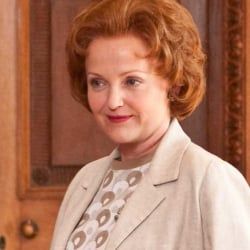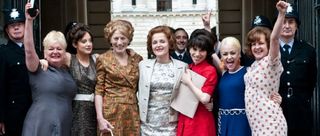Interview: Miranda Richardson Embodies History In Made In Dagenham

Signing on to play Secretary of Labor Barbara Castle in Made in Dagenham, Miranda Richardson had the unenviable task of portraying an iconic character in British history, who helped shepherd the country's landmark Equal Pay Act in 1970. Luckily for Richardson, she's an actress and not a historian, coming to the role of Castle knowing little about the woman herself, but a lot about how to embody the character with verve, wit, and yes sex appeal-- not exactly what you expect to see from a female politician who was 58 when the events of the movie took place, but perfect for Made in Dagenham's energetic take on history.
Telling the story of the female employees at a British auto plant who went on strike demanding equal pay, Made in Dagenham stars Sally Hawkins as the unlikely leader of the striking women, with Richardson's Castle paying attention at the highest levels of the government to eventually make the Dagenham workers' demands a reality. A few weeks ago I talked to Richardson about the challenges of playing a real-life person, why she's never felt constricted by either gender or age in her acting career, and how working with women on a movie set-- including on the recently cancelled and beloved AMC series Rubicon-- can make a huge difference in how everyone works together. Made in Dagenham opens in limited release this week.
In addition to being this powerful female character, Barbara is also really funny.
Absolutely. She was so many things, Barbara, and I feel more and more attached to her the more I talk about her. I knew nothing about her at the time [I signed on]. She's juicy. Always engaging with people, always debating, interested, listening, truthful, humane, drinking, liked sex. She's great! You feel like you'd want to spend an evening with her.
You had no memory of her from growing up?
You're aware of her. You see documentary footage now and then. She's iconic. She's just not in the everyday news, and I haven't studied her or done women's studies or anything like that. I came to her fresh, really, and read her biography and looked at such clippings as they had, news footage, a documentary about her when she had left government. The same phenomenal energy, helpfulness, passion. She's doing exactly what she needed to be doing.
Do you feel like you avoided the pressure of playing a real person by not being that familiar?
CINEMABLEND NEWSLETTER
Your Daily Blend of Entertainment News
No, I was nervous, but I couldn't resist. I thought the scenes I had to do, they feel authentic, the way they're written.

She's got so many good lines. How much of that is historical record, do you know?
I think it's essence of Barbara more than what was actually said. There's some artistic license there. It would be interesting to find out what women at the time thought of her, women who weren't necessarily part of the feminist movement, how she came across. Whether she came across like a version of Margaret Thatcher. Some people have said, rather unkindly, well, she paved the way for Margaret Thatcher, and they're diametrically opposed in their politics.
Britian has had so many more high-profile female leaders than we have in the U.S. Why do you think that is?
Well, but women are high up in government in Brazil, and there's Golda Meir, and Benazir Bhutto. There is in our time more evidence of women in power, but there's still a long way to go. And women are such phenomenal negotiators that they're indispensable in politics. It's when women become more male than the male. There was a time in the 80s when that was going on, women were quailing in front of their female bosses. That was terrifying to me. It seemed like a betrayal of what women are.
At the end of the movie we see that they passed the Equal Pay Act, but given that this happened 40-odd years ago, you'd think we'd be further along with equal rights by now.
It does seem archaic really, and it drives me crazy. I think it's different in my profession because women can be much higher paid than men on any given job, but it's about your viability, your commercial worth and all that, which can change in a moment. I've never felt stigmatized in my profession, nor have I allowed myself to. I don't feel either male or female, I feel I am just me, and I should be able to do whatever I like. I think that it's often true in this profession that women are given the opportunity to be something else. You can have women Hamlets, you can have women Richard IIIs, but it's not really about that for me. It's just about feeling that you can and you could.
And you've been able to keep that even in the film industry, which is so rigidly defined on gender and appearance?
I know. Somehow I've dodged my way through.
A lot of actresses kind of do the opposite and get so constricted by the limits that they fall apart, especially for actresses getting older. You've been able to avoid that too.
Well part of it is begin British, because there's less of a stigma about that. I think it must be so hard here, the stakes are so high. It can make people into monsters quickly. My roots are still in Britain, that's where I live, that's the place where I come from. I'm visiting rather than being in amongst it. But I hope it goes on. I keep it going as long as possible.
Filmmaking is seen as such a male-dominated industry in kind of a similar way that politics is. Do you see those parallels, and is Made in Dagenham, with such a strong female cast, kind of an antidote to all that male-dominated work?
You're aware that there are a lot of men on set, but actually there were quite a few women on set in the crew. My heart always leaps when there are women in the crew, female riggers and clapper loaders. There should be a mix. I've worked with a number of women directors and really enjoyed it. It tends to be a good atmosphere on set. The television series I did here [the recently cancelled AMC series Rubicon] there were lots of women on set, it was a phenomenal crew in general. I think women are fabulous collaborators and great negotiators. The crew was at least half male on this show, and they were just great. Nobody needs to show their ego and raise their voice, they just got on with it.

Staff Writer at CinemaBlend
Most Popular





